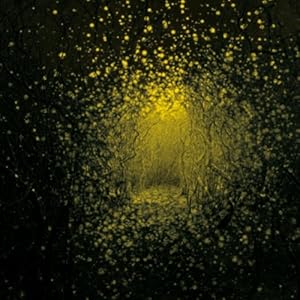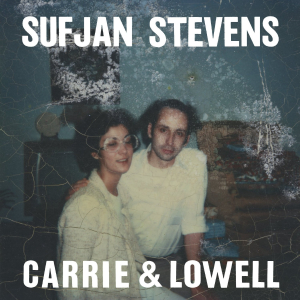
11. Bright Eyes -
The People's Key. After a very uneven 2007 release in "Cassadaga" and a 4-year hiatus, Bright Eyes return with a surprisingly solid album, given how spotty Oberst's side projects had been. Oberst really
sings on "The People's Key," sounding as confident as ever -- and for good reason: his lyrics, though now much more abstract than emotional, remain some of the best of our generation, and his voice has developed so he can now harmonize better than ever. Moreover, after the grandiose "Cassadaga," Mike Mogis displays some much-needed restraint in the studio, focusing more on melodies than worldly soundscapes. What follows are some of the catchiest songs Oberst's ever produced, with "Beginner's Mind" perhaps his band's greatest triumph. "The People's Key" may conclude Bright Eyes' stellar, near-15 year catalog, and, if that's the case, Oberst ends his inspirational, prolific, and influential project on a high note.
10. Kanye West and Jay-Z -
Watch the Throne. I have a major problem with songs "featuring" other artists. I feel that more often than not the meaning of the song is compromised when another person adds in his/her verse. Often when the featured guest tries to stay on the song's theme, he/she oversimplifies it or drops a cheesy metaphor to ruin the listening experience (see: Young Jeezy in Drake's "Unforgettable" or Lil Wayne in Drake's "The Real Her" for examples). But when Kanye and Jay Z, two of the biggest names in the music industry, recorded "Watch the Throne"
together, I was intrigued, albeit a little skeptical. When I listened to the album, though, I heard a collection of loud, witty, brilliantly produced songs that seemed like neither Ye's nor Jay's individual work, but something that melded their two styles together: it was distinctly theirs. You know its Kanye and Jay on radio hits "Ni***as in Paris" and "Otis," but you can also tell the songs come from "Watch the Throne:" Jay motivates Kanye to rap harder than ever, while Kanye challenges Jay's recent lyrical/instrumental complacency. Besides being able to hear two prolific artists changing their style to make something great, it was most enjoyable to hear Ye and Jay competing with each other, ricocheting lines off each other in "Otis" or even trying to be the most introspective and, surprisingly, vulnerable on "New Day." Perhaps after accomplishing so many individual accolades, Jay and Ye needed to record together for inspiration. Kanye and Jay seem to not only encourage but also to threaten one another; these guys have always been known for both their egotism and paranoia ("they want me dead," Jay admits on "Why I Love You"), so it's not inconceivable that the rappers are watching each other to protect his (however imagined) throne atop the rap/hip-hop world.

9. Frank Ocean -
Nostalgia, Ultra. I actually wrote my first blog post on Frank Ocean's "
There Will Be Tears," the ninth track off his debut mixtape. I discussed Ocean's heart-on-sleeve honesty and poetic craftsmanship, which surprised me knowing his affiliation with Odd Future. That basically can sum up this amazing, surprisingly endearing mixtape, as Ocean's lyrical craft and impressive ear for beats make "Nostalgia" a thoroughly enjoyable listen. True to its title, Ocean's mixtape encompasses a wide range of feelings: the happiness, sadness, jealousy, anger, naivete, lust, and heartbreak we can vividly remember from our past. Nostalgia emerges in the first track, where Ocean re-imagines Coldplay's "Strawberry Swing" to sing about lost love and youth during war: "When we were kids / We handpainted strawberries on a swing / Every moment was so precious then / I'm still kicking / I'm daydreaming on a strawberry swing." That's pretty much the poem I tried to write throughout high school--it both annoys and amazes me how Ocean perfects the poetic imagery and emotions I've been searching for in five lines.
The album's nostalgia persists throughout: even the instrumental tracks, which are mainly the clicking and hissing of cassettes, are named for old NES video games. Yet the distant past also becomes an immediate future; Ocean accesses his memories to make something timely (or timeless) and real, like on the poignant opener. Additionally, Ocean samples instrumentals like "Strawberry Swing," "There Will Be Tears," and MGMT's "Electric Feel" to reinvent them--taking from the sometimes very distant past to create something uniquely his own. Never does this become more apparent than of "American Wedding," which borrows from the Eagles's "Hotel California." Ocean details a young lust/love and hasty divorce, concluding, "It's an American wedding; / They don't mean too much. ...
We had an American wedding /
Now what's mine is yours, American divorce." Ocean continues by begging, "D
on't break my heart / This wedding ring won't ever wipe off," only to admit: "But if you stay, girl if you stay / You'll probably leave later anyway /
It's love made in the U.S.A." Once Ocean's disillusion peaks, the guitar solos begin, sounding as if they were written for this exact moment. The song no longer feels like a cover or a borrowed instrumental; it becomes Frank Ocean's--a remarkable feat for a song whose instrumentals are firmly planted in the rock-n-roll canon.
Ocean's original work is just as compelling; the gritty beat of "Novacane" and ominous piano and bass on "Lovecrimes" mark some of the album's standouts. "Swim Good" is my newest favorite; there's a sense of urgency to it although the song doesn't seem to try to sound overly urgent, even as Ocean threatens "to drive in(to) the ocean." It's hard to describe. Ocean's music simply has many natural qualities to it. When music is this honest, nothing feels forced.
8. The Weeknd -
Echoes of Silence. The third mixtape released
this year by the mysterious R&B artist, The Weeknd, dropped only a few days before Christmas, so I haven't had a lot of time to digest it all yet. Which is probably a good thing: this collection contains the grimmest tales the Weeknd has told yet--not exactly ideal for getting into the holiday spirit. Look no further than "Initiation," where the Weeknd's falsetto croons devolve into deranged, goblin whispers, which maliciously inform a drugged-up girl: "I got a test for you / Baby, you can have my heart / There's just something that I need from you / Is to meet my boys." Pitchfork claims the song is about gang-rape, which doesn't seem all too farfetched, considering the song's violent, propulsive beat. What is most disturbing is the song's catchiness despite its violence and cruelty; it seems perfectly appropriate for an insatiably voyeuristic American audience, which overlooks (or stampedes) morality/ethics to pry into the lives of celebrities. We make nobodys into celebrities just to know everything about them (see: Jersey Shore) and we love to watch people fall. The Weeknd appeals to these American vultures, first showing us the idealized party that mainstream music glorifies, then dragging us to the reality of O/Ds, false love, and the most intense suffering--showing us all the steps that lead to "the fall."
There's so much more to say about this album: its lyrical and musical cohesion, its place in the trilogy of mixtapes, and the freakin' perfect cover of Michael Jackson's "Dirty Diana." This is quickly emerging as my favorite Weeknd album, but since I'm supplementing this information in January, I will leave my rank as is.
 7. Real Estate - Days. It seems trendy and hipsterish to pick P4K's BNM's "Days," but as soon as I heard the pensive chimes and washed-out reverb on opener "Easy," I became hooked on Real Estate's breezy sound. NJ's Real Estate have what I always considered to be an "indie" sound: moody, often brooding pop that is simplistic but meaningful. Why I had such a precise definition of one of the most amorphous genres around today is beyond me, but hearing RE's music brought me back to "easier" listening "days" when I was first discovering independent music and hearing sounds I seemed to be searching for all my life. Some journalists are trying to sell bullshit about how RE's music is Springsteen-esque--that it captures some NJ ethos. But that's not really the appeal to this music (hell, I live in Jersey and don't hear a Jersey sound or influence). What is great about "Days," though, is its cool, laid-back simplicity; you can easily get lost in the sprawling guitars and low-key vocals or you can bang out the drum beat to "It's Real." Real Estate doesn't seem to want to fit in with the lo-fi, SO-CAL "chillwave" movement that's trending on indie blogs; their music, much like Frank Ocean's, seems to just flow naturally without trying to conform to a style or trend. It's genuine and unadorned music--or, simply, "it's real."
7. Real Estate - Days. It seems trendy and hipsterish to pick P4K's BNM's "Days," but as soon as I heard the pensive chimes and washed-out reverb on opener "Easy," I became hooked on Real Estate's breezy sound. NJ's Real Estate have what I always considered to be an "indie" sound: moody, often brooding pop that is simplistic but meaningful. Why I had such a precise definition of one of the most amorphous genres around today is beyond me, but hearing RE's music brought me back to "easier" listening "days" when I was first discovering independent music and hearing sounds I seemed to be searching for all my life. Some journalists are trying to sell bullshit about how RE's music is Springsteen-esque--that it captures some NJ ethos. But that's not really the appeal to this music (hell, I live in Jersey and don't hear a Jersey sound or influence). What is great about "Days," though, is its cool, laid-back simplicity; you can easily get lost in the sprawling guitars and low-key vocals or you can bang out the drum beat to "It's Real." Real Estate doesn't seem to want to fit in with the lo-fi, SO-CAL "chillwave" movement that's trending on indie blogs; their music, much like Frank Ocean's, seems to just flow naturally without trying to conform to a style or trend. It's genuine and unadorned music--or, simply, "it's real."
 6. The Antlers - Burst Apart. After seeing them nearly steal the show while opening for Explosions in the Sky, I knew I needed to devote some serious listening time to the Antlers's newest album. While it doesn't live up to their live experience, where the group lets their songs flow into long but tight jams, "Burst Apart" presents some of the richest musical tapestries I've heard in a long time. The group's large dynamics and haunting vocals on "No Windows" and "Parentheses" stand out as exemplars. And when the band chooses minimalism on the closer "Putting the Dog to Sleep," the staccato guitar strikes end the album on an emotional high, as the dog-imagery throughout the album culminates in the painful lines, "
6. The Antlers - Burst Apart. After seeing them nearly steal the show while opening for Explosions in the Sky, I knew I needed to devote some serious listening time to the Antlers's newest album. While it doesn't live up to their live experience, where the group lets their songs flow into long but tight jams, "Burst Apart" presents some of the richest musical tapestries I've heard in a long time. The group's large dynamics and haunting vocals on "No Windows" and "Parentheses" stand out as exemplars. And when the band chooses minimalism on the closer "Putting the Dog to Sleep," the staccato guitar strikes end the album on an emotional high, as the dog-imagery throughout the album culminates in the painful lines, "Prove to me I'm not gonna die alone
... / Don't lie to me, if you're putting the dog to sleep." I've listened to this album dozens of times and I'm just starting to unravel the lyrics; it's so easy to get absorbed in the album's soundscapes, paired with its impeccable pacing, that it almost makes the group's acerbic lyrics an afterthought. Which is great: an album this good should require dozens of spins, and constantly finding/hearing new things make the experience all the more enjoyable.
 Listening that night, the album's profound and complex emotions slowly unraveled before me, and I became helplessly captivated. Not much has changed since then. Upon countless listens, I've found myself awed by Stevens's descriptions of love, heartbreak, depression, and devotion, all of which he centers around his relationships with his often-absent and deeply troubled mother (Carrie) and his heroically loving and seemingly consistently present stepfather (Lowell). In his storytelling, Stevens proves extremely generous, as he's exceedingly appreciative of his stepfather and, most powerfully, forgiving and understanding of his emotionally and often physically unavailable mother. When discussing Carrie, Stevens actually never shows resentment; rather, he succinctly and dispassionately recounts his mom's past negligence ("When I was three, maybe four / She left us at that video store") and insurmountable distance ("I just wanted to be near you," he devastatingly repeats in "Eugene").
Listening that night, the album's profound and complex emotions slowly unraveled before me, and I became helplessly captivated. Not much has changed since then. Upon countless listens, I've found myself awed by Stevens's descriptions of love, heartbreak, depression, and devotion, all of which he centers around his relationships with his often-absent and deeply troubled mother (Carrie) and his heroically loving and seemingly consistently present stepfather (Lowell). In his storytelling, Stevens proves extremely generous, as he's exceedingly appreciative of his stepfather and, most powerfully, forgiving and understanding of his emotionally and often physically unavailable mother. When discussing Carrie, Stevens actually never shows resentment; rather, he succinctly and dispassionately recounts his mom's past negligence ("When I was three, maybe four / She left us at that video store") and insurmountable distance ("I just wanted to be near you," he devastatingly repeats in "Eugene"). 




















